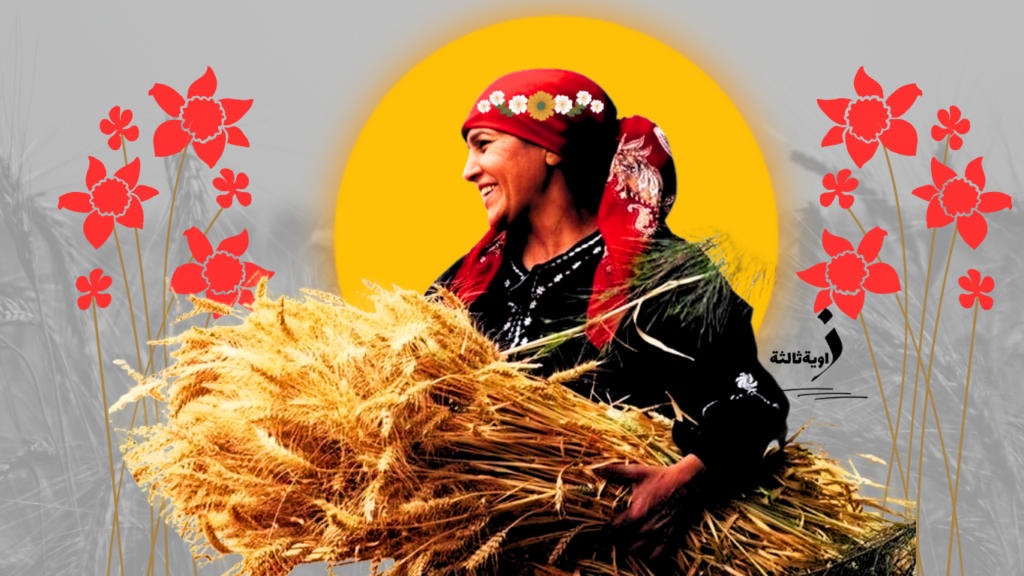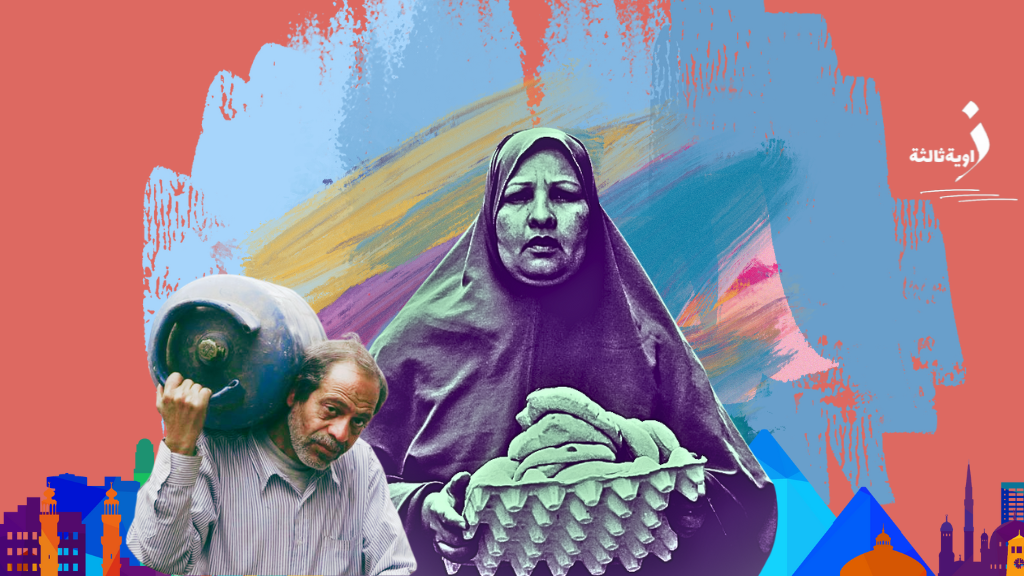At 4 a.m., “Ru’yat” wakes up in a village in the Ibrahimiyah district of Sharqia Governorate, Egypt, preparing for her daily arduous journey she has been undertaking for over 36 years. Before dawn, she leaves her home and boards a semi-truck with a group of women from her village, transporting them to a nearby village where they work in harvesting vegetables, fruits, and other agricultural crops.
During the journey (which may vary), Ru’yat spends her time in a cramped space where movement is limited, alongside over 30 women in a truck container designed for transporting goods. “Along the way, we hold onto each other, falling with each bump to the sides of the vehicle, then we rise again, and this is how we reach the farms,” says Ru’yat.
|
According to the World Bank, the agricultural sector accounted for approximately 19% of Egypt’s total workforce in 2022, with women constituting 45% of the labor force in the agricultural sector, as stated by Dr. Sherifa Sherif, Executive Director of the National Institute for Sustainable Development (the training arm of the Ministry of Planning and Economic Development). |
|
Female agricultural labor plays a significant role in strenuous tasks such as harvesting, manual pest control, and weed removal. Additionally, 94% of harvesting in Upper Egypt and 67% in the Nile Delta is carried out by women, according to the National Institute for Sustainable Development. |
“Rouayat” has been working in agriculture since the age of six to support her family, which consists of her parents and seven other siblings. Her father also worked as a daily agricultural laborer for the past 20 years. After her marriage, Rouayat became the sole breadwinner for her family of six, following her husband’s injury in an accident three years into their marriage.
|
Among 25.8 million families in Egypt, 4.4 million families, representing 17% of the total Egyptian households, are supported by women, according to the Central Agency for Public Mobilization and Statistics (CAPMAS) statement on World Family Day in 2023. |
According to a study by gender studies researcher Mona Ezzat titled “Female Agricultural Workers: Lost Rights,” women agricultural workers in Egypt face various forms of violence and risks during their work. They lack safe transportation and are often transported in inadequate carts, exposing them to dangers including death on their way to and from fields. In cases of injuries resulting in disability or death, families lose a breadwinner without adequate compensation. The study also highlights incidents of harassment experienced by many female farmers during travel to and from the fields, as well as while working in the fields.
A report on farmers’ rights reveals the deaths of 79 agricultural workers, including adults, boys, girls, and women, with 190 others injured due to road accidents involving dilapidated and unfit vehicles and other incidents such as food poisoning on farms or fires. The report drew on relevant studies, reports related to the agricultural sector, and news published in Egyptian newspapers from January 2016 to September 30, 2016, as well as specific cases and complaints received by the center.
Dont’t miss: Crossing into Death.. Decrepit Ferries and a Concrete Alternative
Amal, a 45-year-old agricultural worker from a village in El Sharkeya, witnessed the death of her friend due to unsafe transportation. Over ten years ago, while traveling to work at a farm in Ismailia Governorate, their truck driver sped through a makeshift barrier, causing Mervat (the friend) to fall and die instantly. Amal described how Mervat’s death left behind her one-year-old daughter and three other children, the eldest just four years old.
Ru’yat was luckier than Mervat but still suffered injuries when a similar incident occurred during her journey to work on tomato seed planting in the Beheira Governorate at the age of twelve. Ru’yat sustained a pelvic fracture and other injuries when the trailer she was traveling in with other female farm workers collided during the commute. She returned to work three months later after recovering in a government hospital.
According to Ru’yat, over 40 female farm workers were aboard the vehicle during the accident.
![]()
Ibrahim Mohamed (36), a contractor in the Delta region, told Zawia3 that his work begins with negotiating with landowners, gathering male and female workers, and providing a transport truck to the agreed-upon agricultural site. The average number of workers in the truck ranges from 25 to 30 daily, depending on agricultural seasons and land area.
Mona Ezzat, Chair of the Al Noon Foundation’s Board of Trustees and study author, speaking to Zawia3, highlighted the challenges faced by illiterate female agricultural workers in complex communities, leaving them unable to defend themselves or report workplace violence, fearing job loss or societal rejection.
To protect herself from verbal harassment endured since starting agricultural work, Mona (19) wears a face veil (niqab) during her daily commute on the truck to and from agricultural lands in Giza Governorate’s villages.
At dawn, Mona leaves her home in Giza’s Jazirat Al Salam village, boarding the transport truck provided by the agricultural supervisor she works for. About an hour later, she arrives to begin harvesting crops with her colleagues according to different seasons.
Amal, a 30-year veteran in agricultural labor, discussed the wage gap with her male counterparts. She earns 80 Egyptian pounds per day ($1.70), while a male peer doing the same job earns 130 pounds ($2.80), according to the official exchange rate, except during the wheat harvesting season from mid-November to early December when wages increase slightly.
Ibrahim, working as a contractor for five years, pays male agricultural workers 150 pounds ($3) per day versus 80 pounds for female workers.
|
According to the International Labour Organization’s report titled “Sector Selection and Rapid Market Assessment in the Agricultural Business Sector in Egypt” published in 2020, the agricultural sector ranks fourth out of eight sectors where women earn lower average wages than men. |
Nehal El-Sayed, a lawyer and executive director of the Voice Initiative for Women’s Rights Support, tells Zawia3 that the educational level of women and girls working in agriculture may be a primary reason for their employment in this sector, despite their awareness of their rights deprivation. Additionally, despite their full awareness of the absence of legal protection and healthcare, they are compelled to work for minimal amounts instead of none.
![]()
Legal Discrimination
The Unified Labor Law No. 12 of 2003 excluded women working in pure agriculture from its provisions related to female employment, thus not recognizing them within its scope. Article 97 of the law states: “Female workers in pure agriculture are exempted from the provisions of this Chapter.”
According to Nehal El-Sayed, the motivations behind the legislature’s exclusion of female agricultural workers from the law’s provisions stem from considering the nature of women’s work in rural areas as supplementary to their household roles. This situation is viewed as explicit injustice against rural women and exploitation by their husbands first, followed by intermediaries recruiting women for agricultural work, seeking to benefit from female labor and perpetuate gender wage gaps.
“Nehal” adds that there is a significant problem with the deliberate oversight of Egyptian law regarding women working in agriculture, leading to their deprivation of any rights or guarantees. Therefore, it is essential to first highlight the challenges and circumstances faced by female agricultural workers. To achieve this, “we must engage in dialogues and discussions to push forward the principle of gender equality.”
All the women met by Zawia3 agreed that they had experienced various forms of violence and mistreatment during their work, sometimes escalating to physical abuse by employers. According to the National Institute for Sustainable Development, the agricultural sector is responsible for 32.4% of informal female employment.
“Ezzat” explains to Zawia3 that one of the reasons she undertook the study of female agricultural workers was to emphasize the urgent need to address the economic and social challenges they face through collaboration between various entities such as the Egyptian government, unions, and civil society. This collaborative effort aims to improve the conditions of female agricultural workers in Egypt.
She further states: “Therefore, we have put forward recommendations that include cooperation between the government and unions, such as establishing a database for agricultural workers, both men and women, to integrate them into social protection systems (pensions, healthcare), and engaging in dialogue with company owners, investors, and farm owners to improve working conditions and ensure the implementation of decent work standards.”
The Trade Unions Organization Law No. 213 of 2017 allows agricultural workers the right to establish a union. Article 4 of the law states that “workers have the right, without discrimination, to form trade unions and to join or withdraw from them, according to the rules and procedures stipulated in this law and its executive regulations, and the basic regulations of these organizations.” However, Hanan Abdel Hakeem, president of the Small Farmers Union in Minya, faced many obstacles during her journey to establish the union, as she explained to Zawia3.
She says: “When I went to the Ministry of Labor, the official refused to accept the papers for establishing the union and tried to hinder me, despite having the required number of 60 members.” She also faced severe rejection within her village simply because she was a woman seeking to establish a union. Additionally, many villagers collaborated with the mayor to launch a smear campaign against her and those participating in establishing the union. Hanan credited the completion of the union’s establishment to the determination of its members, their support for her, and the assistance of civil society in establishing the first union for small farmers originating from Upper Egypt.
The union was established in April 2023, and its membership has now reached 700 members, with 95% of them being women. The union aims to work towards combating violence against women working in agriculture, particularly women working in the cotton fields, and advocating for their rights.
Despite her efforts to establish the first union for small farmers in Upper Egypt, Hanan says that unions alone cannot improve the conditions of agricultural workers in Egypt. This requires cooperation between the Egyptian government, unions, employers, and a commitment to finding solutions to improve the conditions of agricultural workers, especially women.
After a long day, “Ru’yat” returns to her home to prepare food for her husband and children, clean the house, and feed the birds she raises to help with their living conditions. At the end of the day, she tries to steal a few hours of sleep, only to wake up again and prepare for her daily morning journey.
We attempted to obtain a comment from Dr. Sayed Khalifa, president of the Farmers Syndicate, but he refused to communicate with our platform, stating: “I only provide statements to media outlets affiliated with the National Media Authority.”












